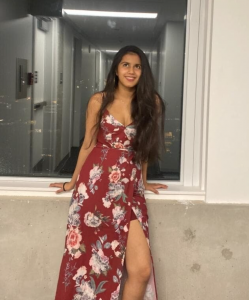
“When I was in eighth grade, I saw a counsellor and I remember telling my friend about it who then said, ‘We thought you were good’. The judgemental response took me aback because these were my close friends and I wasn’t expecting that.
It was studying psychology and speaking to really good counsellors that made me realize that I really want to do this. I want to be the one person that people can come to speak about their issues and help make their lives better. I know that it’s more difficult in India because there’s such a stigma associated with it.
I know a lot of people who are conscious about their health and for that they need to eat or sleep well. For me, my mental health is what I treat as health. I think I’m more cautious about that than I am about my own physical health. Not only because I know how much it affects who you are but mental health affects your physical health. It has life long impacts on you. To me, it’s not just a term. It is not a trend. There’s a difference between having a cold and I’m mentally sick and I don’t know how to get better. To me, mental health is a priority.
I grew up in an Indian culture where my parents were always sacrificing everything for others. Whether it be their kids, family, or random people, that’s how they were taught. You should always be second and everyone else should be prioritized as first. But by acknowledging my own mental health, I need to put myself first.
While there is more acceptance in India, people still lack the knowledge about mental health. It is stigmatized so much that counsellors themselves can’t acknowledge the issue.
My counsellors in India didn’t acknowledge things like depression. I remember going to one and they kept saying that it was academic stress but I told them that I wasn’t stressed about my studies. They kept telling me that I was too young— but it’s not like puberty that comes at a specific time. I remember that I felt worse than ever because I thought that the one person who would get this was not getting it. It took me two other counsellors to realize that I had depression and anxiety.
It took me to go to another counsellor who wasn’t my typical counsellor because I normally went to women who were older. [This time], I went to a young [male] counsellor and he was the one that got through to me. He just understood and listened to everything. While I kept saying that it was a problem, he kept saying that it really wasn’t.
The stigmatization of therapy is harming all around us. It’s just the fear that people don’t want to be known as ‘that person who goes to therapy’ but going to therapy just means acknowledging your problems.
I remember meeting a counsellor who told me that if you could treat yourself the way that you treat others, you will live a much happier life. That got to me because I [knew] that I’d be happier if I forgave myself as much as I forgave others.
One time, my mom told my family that I had seen a counsellor. She said that [I] had a really good experience and that I had become so much happier but I remember one of my family members telling my mom that she couldn’t speak about this here. But my mom said, ‘Why? This was a happy event.”
But by her being open, this got two of my relatives to contact her the next day to give them the number of the counsellor. The fact that they took the number was good to know because it did affect them in a way and I’m happy that she spoke up.
The more open you are, the less judgemental people will become.
Mental health can affect anyone. Once, someone asked me, ‘Khushi, how are you always so happy?’. I have never seen you sad. I was just like you don’t know and led me to open up about my mental health. It then ended them saying that I was just being so dramatic. And I was like what do you mean?
That statement made me wonder whether I was actually overreacting. My best friend just looked at me and said don’t let them go against your experience. Don’t let them construct your narrative. Talking to my friend made me realize that I’m not as okay as I pose myself to be. I know that I am struggling and I need to accept that.
While I’m open about accepting others, accepting myself is still taking time. I want to become one of the counsellors who I had who got through to me and was there for me. Psychology has taught me that just shutting people out is not the way to do things, but by being more accepting and forgiving of yourself and others is a powerful act.”
